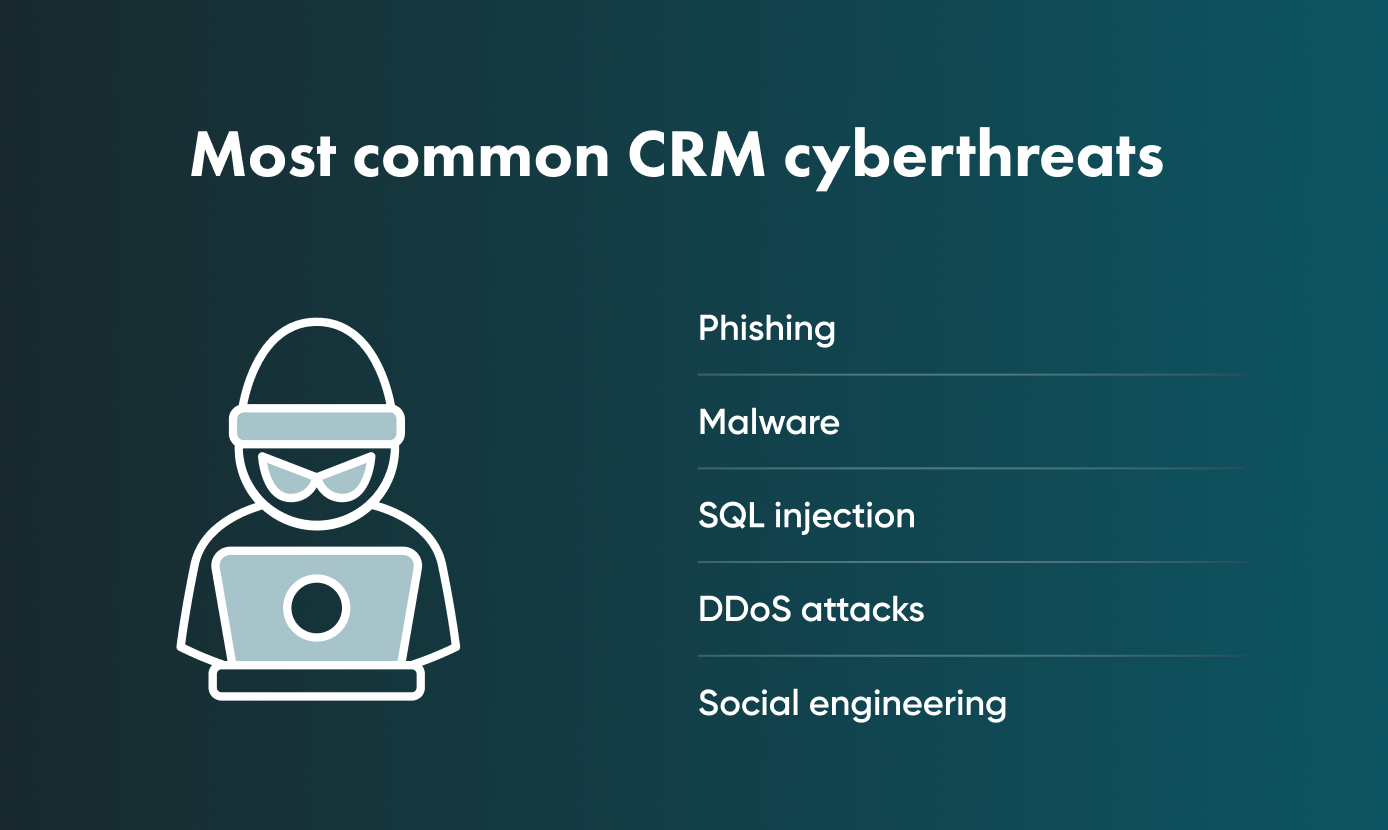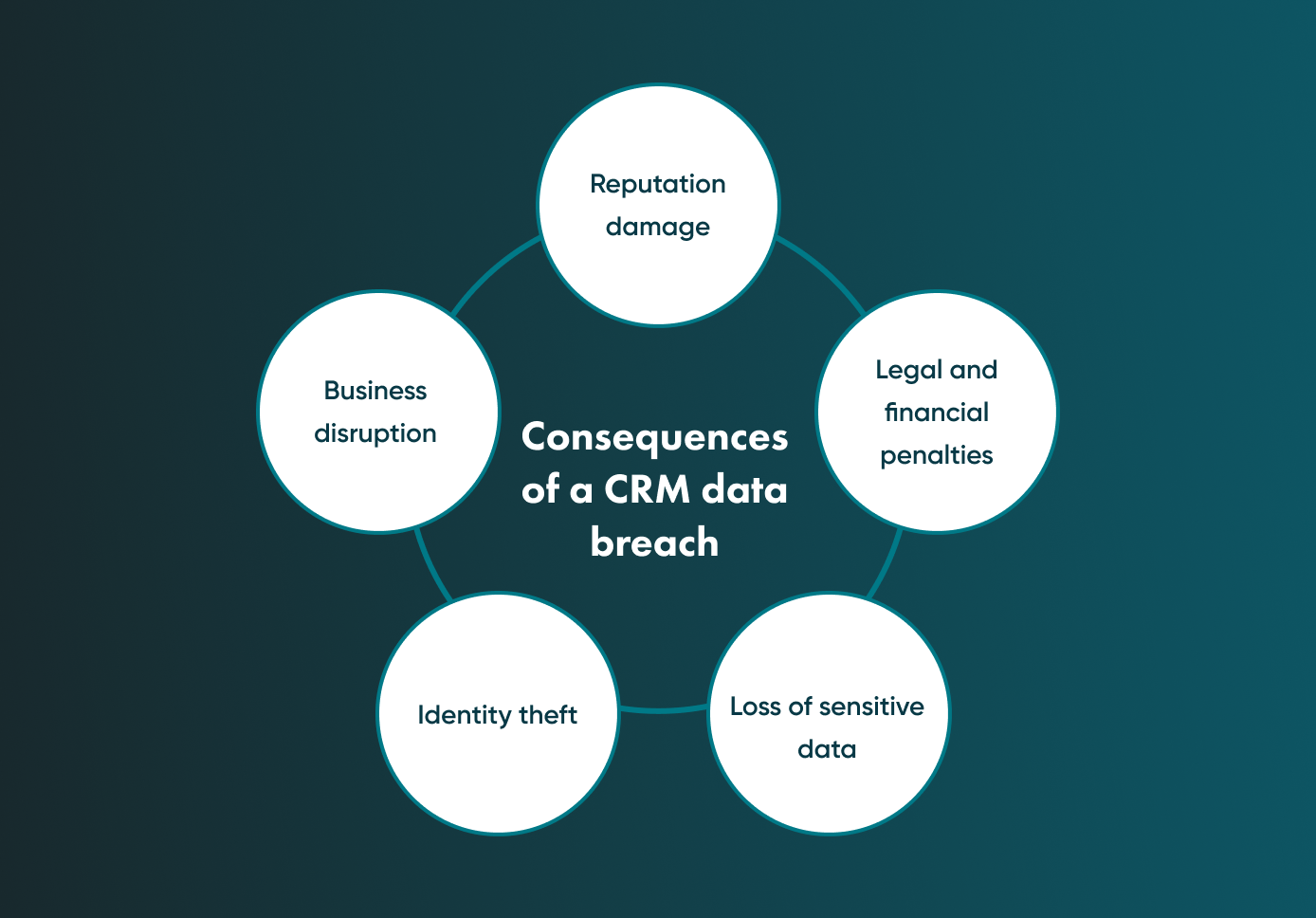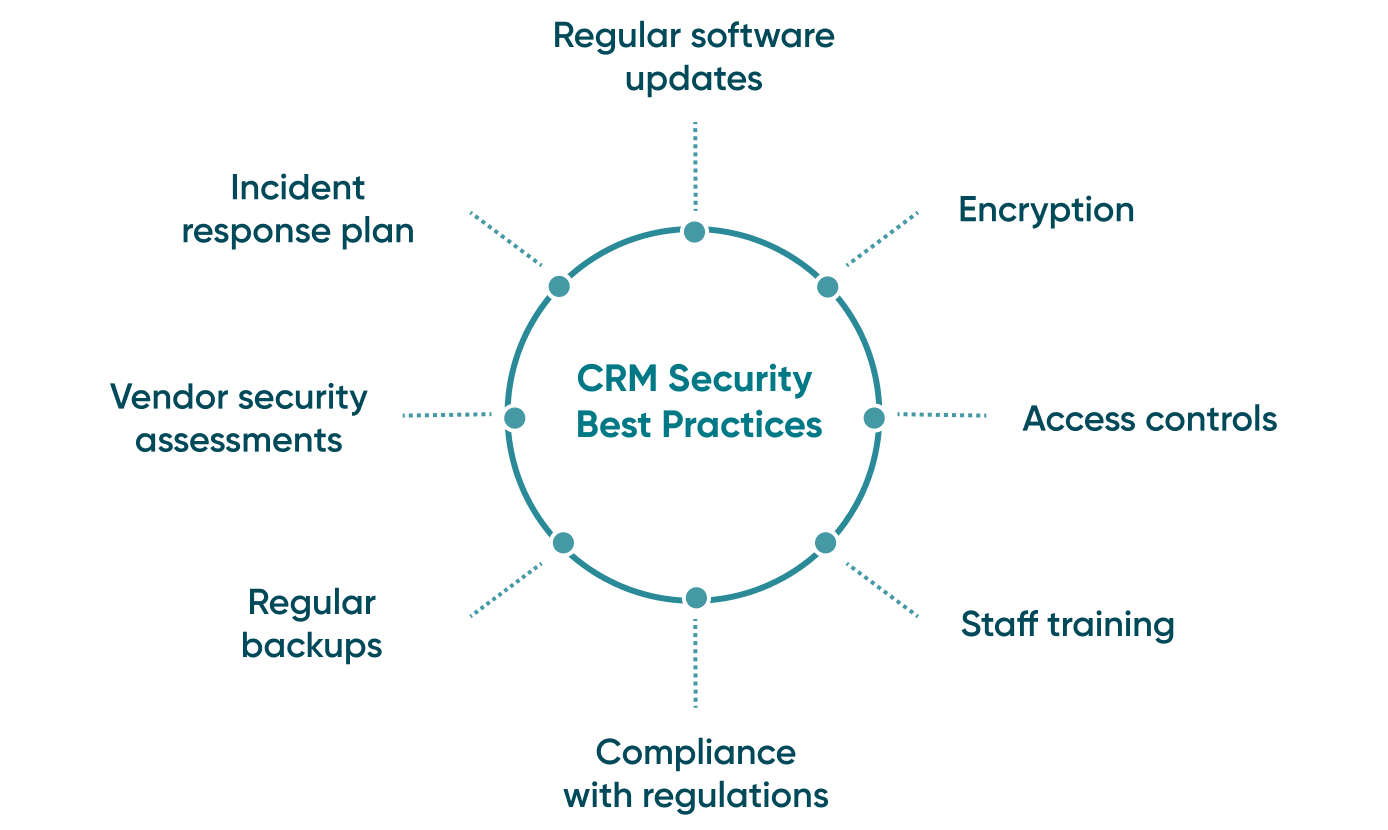How to Secure CRM Software and Ensure Data Privacy


Customer relationship management (CRM) software has become an essential tool for businesses to manage their relationships with customers and clients.
However, with the increasing amount of sensitive data being stored in digital management systems, it has become crucial for organisations to implement robust CRM security measures in order to protect against cyberthreats and ensure data privacy.
A data breach can have severe consequences, including reputational damage, legal and financial penalties, and loss of customer trust. Therefore, securing CRM software and ensuring data privacy is no longer an option, but a real necessity that has to be addressed proactively.
This article will provide a comprehensive guide on securing CRM data and ensuring data privacy.
We will discuss the common threats and vulnerabilities that exist in CRM systems, the best practices and tools for securing CRM software, and the importance of employee training and compliance with data protection laws and regulations.
After reading this guide, you will have the knowledge and tools necessary to protect against potential threats and maintain the security and privacy of a CRM system.

Most common CRM security risks and threats
Various types of cyberattacks can be launched against CRM systems, each potentially compromising the security and privacy of sensitive data.
Let’s look at the most common types of cyberattacks on CRM systems.
Phishing
Phishing is a common cyberattack that can affect CRM systems. Phishing attacks can be highly effective because they often exploit human behaviour, such as curiosity or fear.
These attacks involve using emails or messages that appear to be from a legitimate source, such as a trusted vendor or business partner, to trick users into providing sensitive information, such as login credentials or financial data.
Malware
Malware, short for malicious software, is designed to harm computer systems, steal data, and disrupt normal operations.
This type of attack can be devastating for CRM systems, leading to the loss of sensitive customer data, system downtime, and damage to a business's reputation.
Malware includes viruses, trojans, and ransomware, which can be used to gain unauthorised access to CRM systems, steal data, or lock users out of their accounts until a ransom is paid.
SQL injections
These attacks exploit vulnerabilities in the software used to build and manage CRM systems, allowing attackers to gain unauthorised access to databases and steal or manipulate sensitive data.
An SQL injection attack occurs when a perpetrator sends malicious SQL code as part of a user input, such as a form submission or search query.
The database can then execute this code, potentially allowing the attacker to view, modify, or delete data within the CRM system.
Distributed Denial of Service (DDoS) attacks
DDoS attacks involve overwhelming a CRM system with traffic, causing it to crash or become unavailable. It can result in a loss of service and potential data loss or theft.
In a DDoS attack, many compromised computers flood the target system with traffic, creating what’s known as a botnet and reducing its capacity to handle legitimate requests.
Social engineering
Social engineering attacks rely on human interaction to trick users into providing sensitive information or performing actions that can compromise the security of the CRM system.
For example, attackers can steal sensitive data from CRM systems, such as customer names, addresses, and payment information, by tricking users into providing this information or their login credentials.
Social engineering attacks can also involve the distribution of malware through email attachments or links, which can compromise the security of the CRM system.
You’ll find more information about types of cyberthreats in our relevant article, so feel free to read it next.
Common vulnerabilities in CRM systems
Also, you need to know what vulnerabilities your business may face when working with a CRM database. Several common vulnerabilities exist in CRM systems that can put data security and privacy at risk. We’ve covered some of the most common ones below.
Weak authentication and access controls
These can present significant vulnerabilities in CRM systems. Authentication is the process of verifying a user's identity, while access controls refer to the mechanisms that restrict user access to different parts of the CRM system.
Weak authentication and access controls can allow attackers to gain unauthorised access to the CRM system, steal sensitive data, or modify information.
Need for more encryption
Lack of encryption is a vulnerability that can leave customer relationship management systems open to attacks.
Encryption is the process of encoding information in a way that can only be read by authorised users using the appropriate key. Without encryption, sensitive data stored in a CRM system can be intercepted and read by attackers who gain access to the network or system.
Some common examples of data that should be encrypted in a CRM system include personally identifiable information (PII), financial data, and confidential business information.
This data can be accessed by both external attackers and insider threats, such as employees who may have unauthorised access to the CRM system.
Lack of updates and patches
Regular software updates and patches are essential for addressing security vulnerabilities and protecting against newly discovered threats.
Failure to apply updates can leave systems vulnerable to attack.
Third-party integrations
Integrating third-party applications or services with a CRM system can introduce new vulnerabilities and increase the risk of data breaches. Each integration can act as an additional access point, so you need to make sure your providers follow strict security standards.
Insider threats
Insider threats can pose a severe risk to data security and privacy. Employees, contractors, or partners with authorised access can intentionally or accidentally cause a breach.
Remember that it's essential to regularly assess and address these vulnerabilities in CRM systems to ensure that data remains secure and private. Go Wombat can help you with this.
What is your next step to secure sensitive data? First, contact Go Wombat, and we will take care of the rest.

Consequences of a CRM data breach
Falling victim to a major data breach is nothing short of an emergency.
Data breaches in customer relationship management systems can severely affect businesses, customers, and other stakeholders.
The main consequences of data breaches in CRM systems include the following:
Reputation damage
Reputation damage is a potential consequence of a data breach or cyberattack on a CRM system.
When customer data is compromised, it can result in a loss of trust and confidence in the business and damage its reputation.
The loss of customer trust can lead to a decrease in sales, loss of revenue, and even legal action if the business is negligent in securing customer data.
In addition, the negative publicity resulting from a data breach or cyber attack can also have a lasting impact on a business's reputation, leading to decreased customer loyalty and difficulty attracting new customers.
Legal and financial penalties
These penalties can be severe, mainly if the breach compromises personally identifiable information (PII) or financial data.
Legal penalties may include fines, lawsuits, and legal settlements. The amount of these penalties can vary depending on the severity of the breach, the number of affected customers, and the jurisdiction in which the breach occurred.
For example, under the General Data Protection Regulation (GDPR) in the European Union, businesses can face fines of up to 4% of their global annual revenue for noncompliance with data protection regulations.
Loss of sensitive data
Data breaches can result in the loss or theft of sensitive data, including customer names, addresses, phone numbers, financial information, and other personal details.
When sensitive data is lost or stolen, it can have severe implications for businesses, including legal and financial penalties, damage to reputation, loss of customer trust, and loss of competitive advantage.
Identity theft
Stolen personal data can be used for identity theft and fraud, resulting in financial losses and damage to credit scores.
The consequences of identity theft can be severe for both the individuals whose information is stolen and the businesses that are responsible for protecting that information.
Business disruption
A data breach can cause the CRM system to become unavailable or compromised, leading to a loss of productivity and revenue for the business. If a data breach is severe enough, it can even temporarily force a company to shut down.

CRM security best practices: 8 steps to follow
Companies should implement best practices to ensure data security and privacy in a customer relationship management system.
1. Regular software updates
Regularly updating CRM software can help patch vulnerabilities and protect against known threats.
Keep all software and operating systems updated with the latest security patches and updates. That said, you also need to ensure that all updates are compatible with your CRM system.
In addition, it is crucial to automate updates and patches to ensure they are applied promptly without causing disruptions to business operations.
By regularly updating CRM software and implementing these best practices, businesses can minimise the risk of cyberattacks and data breaches, safeguard sensitive data, and maintain the trust of their customers.
2. Encryption
Encryption is a critical aspect of data security and privacy in CRM systems. Using encryption to protect data both in transit and at rest can prevent unauthorised access and ensure data privacy.
Use strong encryption algorithms such as AES (Advanced Encryption Standard) to encrypt sensitive data.
Avoid using weaker encryption algorithms that can be easily compromised. Also, use secure communication protocols such as HTTPS, SSL, or TLS to protect data in transit. Avoid using unsecured communication protocols such as HTTP or FTP.
3. Access controls
Implementing access controls, such as two-factor authentication (2FA) and role-based permissions, can help ensure that only authorised users can access sensitive data. What’s more, it will contribute to protecting customer information.
Role-based access control (RBAC) allows limiting access to sensitive data based on an employee's job responsibilities. RBAC ensures that employees have access only to the data they need to perform their job duties.
Use 2FA for all employees accessing the CRM system. 2FA adds a layer of CRM cybersecurity, requiring employees to provide 2 forms of authentication before accessing sensitive data.
4. Staff training
Providing regular training to employees on identifying and responding to potential cyberthreats can help prevent data breaches caused by human error.
In addition, it's vital for all employees who have access to sensitive data to understand the best practices for data security and privacy.
You must provide employees with an overview of the company's security policies and procedures, including data access controls, password policies, and incident response procedures.
5. Compliance with regulations
As mentioned earlier, organisations should comply with data protection regulations such as GDPR and HIPAA to avoid legal and financial penalties.
Therefore, CRM security compliance remains one of the essential practices you must follow. You can find more info about GDPR and HIPAA compliance in a detailed article we previously posted.
6. Regular backups
Regularly backing up CRM data can prevent data loss in the event of a breach or system failure. Regular backups are essential to ensure data security and continuity in CRM systems.
Backups create a secondary copy of your files, which can be restored in case of data loss or corruption. This loss of data can occur for various reasons, including hardware failure, natural disasters, or cyberattacks.
7. Vendor security assessments
Many businesses rely on third-party vendors for CRM software, which means that the security of the CRM system can be affected by the vendor's security. Therefore, it is essential to conduct vendor security assessments to evaluate vendors' security practices and ensure that they meet the proper security standards.
However, you can skip this option if you have custom CRM software from scratch. In this case, a software development company like Go Wombat can create it following a CRM security policy and adequately protecting all sensitive data.
8. Incident response plan
Developing and regularly testing an incident response plan can help organisations quickly respond to and contain data breaches.
An incident response plan is essential to any CRM system's security measures. It outlines the steps that need to be taken in case of a security incident or data breach to minimise the impact on the business and its customers.
How Go Wombat assists in CRM data security
Go Wombat provides cybersecurity consulting services designed to make your CRM and other software types more secure and reliable.
We can explore your business processes and identify possible risks, then provide you with a plan to mitigate these risks.
When we write code, we have a secure development policy, which means performing code reviews to detect vulnerabilities.
Also, we configure your security infrastructure if necessary, install a WАF (web application firewall), secure the internal network, and take other relevant measures.
Our team also searches for possible vulnerabilities after the deployment. If we detect any, we help solve related issues.
GDPR technical audits, GDPR policy development, and security awareness training are a few of our additional services that include the knowledge of our qualified CISO (chief information security officer).
Wrapping up
Businesses are responsible for protecting their customers' data from unauthorised access and misuse. This is especially critical for companies that rely on CRM systems, which contain sensitive information about clients and their transactions.
Neglecting data security and privacy can have severe consequences, including reputational damage, legal and financial penalties, and loss of sensitive data.
Data security and privacy are necessary for companies to maintain their long-term success and reputation. In addition, it demonstrates a commitment to ethical business practices and ensures that customer information remains safe from potential breaches. Therefore, businesses should prioritise data security and privacy measures and remain vigilant in implementing the latest security technologies and best practices.
Do you have any concerns about your CRM security? Contact Go Wombat and let our professionals solve all your security challenges.
Unlock Success with Premium Software Development
Contact us


FAQ
What is customer data privacy in CRM?
Customer data privacy in CRM refers to protecting personal and sensitive information that a business collects, stores, and processes about its customers through a CRM system. It includes personal identification details, contact information, transaction history, financial data, and any other confidential information that customers entrust to the company.
Why is data security important in CRM?
Data security is critical in CRM because CRM systems store confidential information about customers and their interactions with the business.
If this data falls into the wrong hands due to a security breach, it can be used to commit identity theft, financial fraud, or other criminal activities. It can result in reputational damage, legal and financial penalties, and loss of customer trust.
What are the threats to CRM systems?
The main threats to CRM systems include the following:
- Phishing (fraudulent attempts to obtain sensitive information by disguising as a trustworthy entity in electronic communication)
- Malware (malicious software that can damage, disrupt, or gain unauthorised access to computer systems)
- SQL injections (security exploits where an attacker injects malicious code into a website's SQL query)
- DDoS attacks (distributed denial-of-service attacks that aim to overwhelm a website or server with traffic, causing it to become unavailable)
- Social engineering (attempts to trick users into divulging sensitive information, such as passwords and credit card numbers, through psychological manipulation techniques)
How can we help you ?





